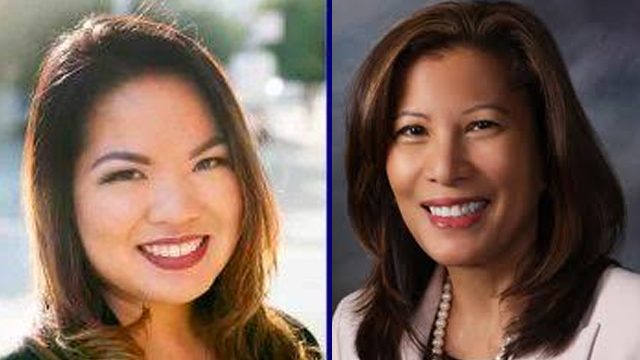SUMMARY
This is AI generated summarization, which may have errors. For context, always refer to the full article.

CALIFORNIA, USA – Filipino American women raising their voices against policies of the Trump administration is nothing new, given their participation in the January Million Women March and sister marches throughout the country coinciding with the inauguration of the 45th President.
But elected women of Filipino descent standing up to the new regime? Unprecedented, at least in this presidential term.
Tani Cantil-Sakauye
In March, Tani Cantil-Sakauye wrote a letter to US Attorney General Jeff Sessions, asking federal immigration officers to cease pursuit of undocumented immigrants in courthouses.
Sacramento native Cantil-Sakauye is Chief Justice of the California Supreme Court, the highest ranking official of one of the 3 branches of state government. She also happens to be a Filipino American and a Republican, the ruling party and party affiliation of Donald Trump.
She did not name specific courts. And while her letter did not rebuke current immigration guidelines, it challenged immigration agents’ activities in areas under her jurisdiction.
“Courthouses should not be used as bait in the necessary enforcement of our country’s immigration laws,” Cantil-Sakauye wrote in the letter that was also sent to Homeland Security Secretary John Kelly.
The first Asian American woman to lead the state high court expressed concern about “reports from some of our trial courts that immigration agents appear to be stalking undocumented immigrants in our courthouses to make arrests.”
An unidentified Judicial Council spokesperson said that following reports from judges and attorneys noting the alarm caused by the presence of Immigration and Customs Enforcement officers, Cantil-Sakauye convened a California Immigration Information Resource Group to gather immigration resources in the state for dissemination to legal organizations and courts.
The spokesperson said “access, public safety, and retaining the integrity and sanctity of the courthouse,” motivated Cantil-Sakauye’s actions.
“Most Americans have more daily contact with their state and local governments than with the federal government, and I am concerned about the impact on public trust and confidence in our state court system if the public feels that our state institutions are being used to facilitate other goals and objectives, no matter how expedient they may be,” Cantil-Sakauye said in her letter.
Bill Ong Hing, a law professor at the University of San Francisco, supported the principle behind Cantil-Sakauye’s letter.
“The court is supposed to be this objective entity where you appear to get a fair resolution of problems,” said the director of the USF Immigration and Deportation Defense Clinic. “But when incidents like this happen at their home, which is the courthouse, it is viewed as a threatening place rather than as a neutral place. It really does undermine what the court stands for.”
Juslyn Manalo
In a similar vein, freedom from “discrimination, persecution, harassment and assault” moved the City Council of Daly City to unanimously approve a resolution “affirming commitment to support and respect all community members irrespective of immigration status.”
Passed on February 27, the resolution was first introduced by current Vice Mayor Juslyn Manalo, a freshman Daly City Council Member and a Filipino American.
“Daly City is a culmination of cultures and immigrant communities,” Manalo aired her sentiment. “It was imperative that the Daly City Council took a stand to protect and ensure all immigrants feel safe in our city. I am proud to bring this urgent issue to the forefront.”
The resolution followed Trump’s executive order gutting federal funds from cities that uphold sanctuary laws.

Sanctuary cities do not use city funding to implement federal immigration law. Law enforcement in such cities do not inquire immigration status of suspects.
San Francisco’s 1989 sanctuary ordinance stems from the movement where churches offered refuge to those fleeing civil war and persecution in Central America and could not gain asylum in the United States.
Local governments view sanctuary ordinance as a means to earn community trust, particularly in policing, according to a report in the San Francisco Chronicle.
“Some police departments say…’We don’t want our police officers enforcing immigration law because if they do, victims and witnesses of crimes won’t cooperate with us,'” said Kevin Johnson, dean of the UC Davis law school.
Daly City is among towns that do not require proof of immigration status for access to public services.
The Daly City resolution recognized the “fear and concerns among residents…about personal freedom, civil rights, and the treatment of immigrants” as a consequence of the recent pronouncements and actions by the federal government.
“Although Daly City has historically acted in principle as a safe haven or sanctuary for all residents regardless of status or citizenship, the City Council expressed a concern that residents wanted a more definitive statement from local elected representatives about this longstanding ‘informal’ policy,” the City Manager’s Office said in a press statement, explaining the resolution.
The release noted 52% as foreign-born among the town’s 112,000 residents, quoting from the Bay Area Census and the American Community Survey. About 12,000 or 21% are believed to be undocumented.
Manalo, who was born in San Francisco, represents the majority population of color in Daly City, where she grew up with fellow Filipinos who account for almost 40%, according to unofficial estimates. She is one of 4 Filipino Americans on the 5-member City Council led by current Mayor Glenn Sylvester, who is also Filipino American, along with San Francisco-born Michael Guingona, and Quezon City-born Ray Buenaventura.
The resolution stressed the city’s “firm commitment to uphold the Constitution…and traditions of law and due process” while recognizing “the importance of public safety” and a “responsibility to provide appropriate cooperation with federal immigration agencies in matters involving felony criminal activity.”
But it emphasized as “irrefutable” that enforcement of federal immigration laws is the “sole responsibility” of the federal government. – Rappler.com
Add a comment
How does this make you feel?
There are no comments yet. Add your comment to start the conversation.